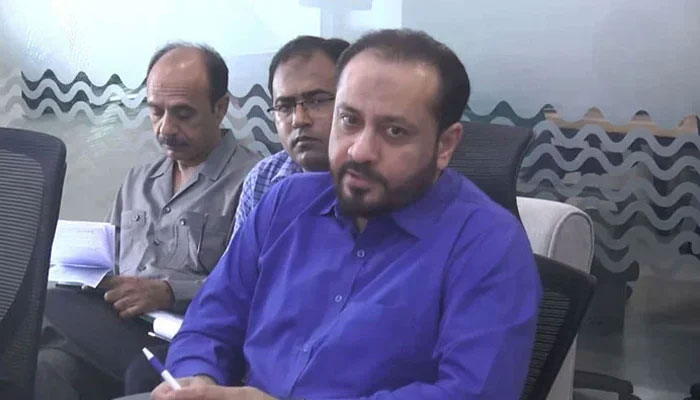Hospitals put on alert to treat smog-affected patients
LAHORE:Punjab Minister for Primary and Secondary Healthcare Khawaja Imran Nazir said on Wednesday that all hospitals in the province must maintain adequate stocks of essential medicines for treating smog-related health issues.
The minister made these remarks while addressing an emergency meeting here, convened on the directives of Punjab chief minister, following a session, chaired by Senior Provincial Minister Marriyum Aurangzeb.
The meeting reviewed the availability of crucial smog-related medicines, including anti-allergy drugs, inhalers, antibiotics, cough syrups, nasal drops, eye drops, masks, and medications for fever and pain relief.
Khawaja Imran Nazir stressed that there must be no shortage of these essential supplies, especially in cities most affected by smog. He directed the Drug Control Department to promptly contact relevant pharmaceutical companies if any shortage of smog-related medications arises, ensuring a swift response to maintain sufficient supplies. The minister also instructed that hospitals and markets regularly check medicine stock levels to guarantee ample availability.
Meanwhile, Khawaja Imran Nazir announced that all private labs, hospitals and clinics in Punjab would soon be legally required to share their data with the Health Department. This announcement was made during a meeting at the Punjab Healthcare Commission (PHC), where he was accompanied by Secretary P&SHD Nadia Saqib. PHC Chief Executive Officer (CEO) Dr Saqib Aziz briefed the attendees on the commission’s performance and future plans.
In his address, Khawaja Imran Nazir said that legislation was forthcoming to enable comprehensive data analysis, aiming to enhance healthcare insights and patient care. He also noted the need to streamline the patient referral system to better manage patient load. Efforts are under way, he said, in collaboration with the Public Service Commission, to recruit anesthesia specialists for public hospitals, with an Anesthesia Management System being introduced to optimise their deployment. He directed all Primary and Secondary Healthcare hospitals to expedite their PHC licensing processes.
The health minister also raised concerns over kidney failure cases linked to the overuse of antibiotics, highlighting plans for legislation to restrict antibiotic purchases to those with a doctor’s prescription. He stressed the need to intensify the crackdown on quackery in healthcare.
Secretary Nadia Saqib reported that 200 female medical officers have recently been appointed in government hospitals, and the Public Service Commission has received a request for an additional 1,000 medical officers.
She added that the registration process for beauty salons and barber shops under the Punjab Hepatitis Control Programme is being fast-tracked.PHC CEO Dr Saqib Aziz stated that data mapping of 95% of hospitals and quack clinics in Lahore has been completed. He emphasised the need for an internationally standardised emergency cadre to improve hospital emergency services. The meeting included key PHC directors, such as Dr Mushtaq Ahmed, Dr Shafqat Ijaz, Additional Director Dr Huma Rasheed, and Deputy Director Arqam Waheed.
-
 Social Media Addiction ‘like Smoking’: Mumsnet Calls For Under-16s Ban With Cigarette-style Warnings
Social Media Addiction ‘like Smoking’: Mumsnet Calls For Under-16s Ban With Cigarette-style Warnings -
 Andrew Mountbatten, Virginia Giuffre's Photos Attached To Buckingham Palace Gates
Andrew Mountbatten, Virginia Giuffre's Photos Attached To Buckingham Palace Gates -
 Everything We Know About Bruce Willis Frontotemporal Dementia
Everything We Know About Bruce Willis Frontotemporal Dementia -
 Singapore's Grab Plans AI-driven Expansion And New Services To Boost Profit By 2028
Singapore's Grab Plans AI-driven Expansion And New Services To Boost Profit By 2028 -
 Adele Reveals How She 'snapped Out Of' Sever Postpartum Depression
Adele Reveals How She 'snapped Out Of' Sever Postpartum Depression -
 ‘Chinamaxxing’ Explained: Inside Viral Gen Z Trend Taking Over TikTok And Instagram
‘Chinamaxxing’ Explained: Inside Viral Gen Z Trend Taking Over TikTok And Instagram -
 Fears Erupt About Sarah Ferguson Pulling A ‘Harry’ While Sitting On A King’s Ransom: ‘Her Leverage Still Stands’
Fears Erupt About Sarah Ferguson Pulling A ‘Harry’ While Sitting On A King’s Ransom: ‘Her Leverage Still Stands’ -
 Lisa Rinna Slams Andy Cohen For His Below The Belt Move: 'So Shady'
Lisa Rinna Slams Andy Cohen For His Below The Belt Move: 'So Shady' -
 Stunning New Photos Of The Milky Way Shed Light On How Stars Are Formed
Stunning New Photos Of The Milky Way Shed Light On How Stars Are Formed -
 Prince Harry, Meghan Face Fresh Calls To Lose Royal Titles Over ‘pseudo-royal’ Visit
Prince Harry, Meghan Face Fresh Calls To Lose Royal Titles Over ‘pseudo-royal’ Visit -
 Gordon Ramsay On His Basal Cell Carcinoma Diagnosis
Gordon Ramsay On His Basal Cell Carcinoma Diagnosis -
 Fukushima Decommissioning: Japan Deploys Snake-like Robot To Remove Nuclear Debris
Fukushima Decommissioning: Japan Deploys Snake-like Robot To Remove Nuclear Debris -
 Brenda Song Turns Macaulay Culkin's 'Home Alone' Into 'terrible' Lesson: 'Children Have To Be A Little Scared'
Brenda Song Turns Macaulay Culkin's 'Home Alone' Into 'terrible' Lesson: 'Children Have To Be A Little Scared' -
 MrBeast Vows To Book Only Starlink-equipped Flights As Global Airline Adoption Surges
MrBeast Vows To Book Only Starlink-equipped Flights As Global Airline Adoption Surges -
 Kim Jong Un Says North Korea Ready To ‘get Along’ With US But Sets Key Condition
Kim Jong Un Says North Korea Ready To ‘get Along’ With US But Sets Key Condition -
 Andrew Fears What Comes Next As Jeffrey Epstein Scandal Deepens
Andrew Fears What Comes Next As Jeffrey Epstein Scandal Deepens




